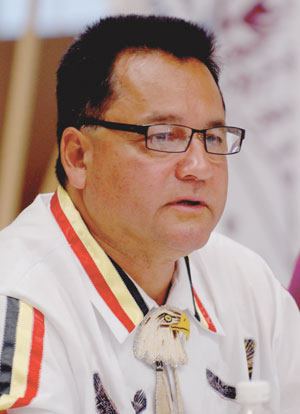With one in 10 aboriginal children under the care of child welfare agencies in Canada, the Anishinabek Nation is developing its own laws in a bid to take over services for families in trouble from the province.

“The idea is to put in place something that is more culturally relevant to the communities,” says Tracey O’Donnell, legal counsel to the organization representing 42 First Nations in Ontario stretching from Sarnia to Thunder Bay to Ottawa.
Over the coming months, the Anishinabek Nation will be holding consultations across the province on what such a law should entail. The sessions began in Thunder Bay this month and will conclude in Toronto on Nov. 18 and 19.
Officials hope to a create a draft law that will go up for review and input by the 42 member nations next year with a view of getting approval by June. Then, it will be up to each community to implement its own version of the framework, says O’Donnell.
“First and foremost . . . the responsibility of taking care of our children rests with us,” says Patrick Madahbee, the grand council chief of the Anishinabek Nation.
“Removing kids from our communities is not the answer.”
Aboriginal communities have a long history of contact with provincial child welfare authorities, particularly since a 1965 agreement that gave Ontario the power to administer services for status Indians on reserve.
In the meantime, controversy has swirled over past practices that saw many aboriginal children end up with white parents, something native communities have since railed against as an injustice similar to that of residential schools.
“If one looks back historically at how Canadian society has dealt with aboriginal children, there have been huge mistakes that have resulted in lifelong harm,” says Nicholas Bala, an expert in family and children’s law at Queen’s University in Kingston.
As a result, he says, aboriginal communities have over the years taken back control of child welfare services by setting up their own agencies. In the Anishinabek case, the goal is to try to keep kids in troubled families within their own communities rather than sending them elsewhere.
Madahbee wants to see a greater focus on prevention, allowing parents accused of things like neglect to get help and counselling so their kids can stay with them.
It’s unclear how a new law would mesh with existing provincial legislation and agencies, however.
In part, the idea is to create a framework that would allow the Anishinabek member nations to create their own services. But extending that concept to the legal realm would be complicated, Bala points out.
In most cases, new aboriginal agencies established in places like Manitoba operate under provincial legal structures.
In one case, the Spallumcheen Indian Band in British Columbia has run its own system under a bylaw it passed in 1980, but so far that model has been the exception. Doing so required the approval of the federal government, something other First Nations that have attempted to set up their own systems haven’t secured.
Bala notes another issue is jurisdiction. O’Donnell says the Anishinabek Nation will be claiming child welfare is an area of inherent jurisdiction under the aboriginal right to self-government.
“The Anishinabek are First Nations and they have inherent jurisdiction over matters that are integral to the nation. There’s nothing more integral to any nation than its people.”
Professor Brad Morse, an expert in aboriginal law at the University of Ottawa, says in the absence of a self-government agreement, the Anishinabek Nation would have to seek recognition of its own child welfare law from the federal and provincial governments.
But, he adds, given that the whole issue of self-government is unresolved, it’s uncertain what the result of any court action on that question would be.
On one hand, like O’Donnell, he says the Anishinabek Nation would have a case to make that child welfare is essential to its survival and therefore an inherent right. On the other hand, the provincial government could claim it had essentially extinguished aboriginal jurisdiction in that area by occupying it many years ago.
For now, Madahbee says the Anishinabek will try to make changes under the existing provincial law.
“Things have to be taken in steps,” he says, noting he will work with the provincial government on the issue. “If that doesn’t happen, we’re going to be implementing this anyway.”
With child welfare, questions remain about how effective aboriginal-run services have been. Bala says while keeping kids in their communities is laudable, it’s not always ideal in small places where there might not be enough appropriate foster families. Heritage should be one factor in determining the best interests of the child rather than the paramount one, he says.
At the same time, Morse says apprehension rates by aboriginal-run agencies have often been higher than those of provincial bodies. But while that casts a shadow on the whole notion of having separate laws and agencies, Morse argues the issue comes down to a lack of funding for aboriginal services by the federal government.
Nevertheless, Madahbee remains determined to carry out the Anishinabek project. Noting provincial agencies tend to identify aboriginal children in care as “client number so-and-so,” he’s vowing to change the system.

 “The idea is to put in place something that is more culturally relevant to the communities,” says Tracey O’Donnell, legal counsel to the organization representing 42 First Nations in Ontario stretching from Sarnia to Thunder Bay to Ottawa.
“The idea is to put in place something that is more culturally relevant to the communities,” says Tracey O’Donnell, legal counsel to the organization representing 42 First Nations in Ontario stretching from Sarnia to Thunder Bay to Ottawa.